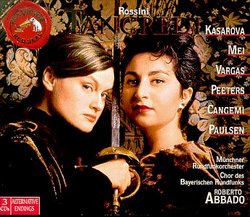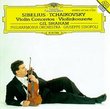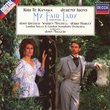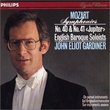| All Artists: Gioachino Rossini, Roberto Abbado, Vesselina Kasarova, Eva Mei, Münchner Rundfunkorchester, Ramon Vargas, Harry Peeters, Veronica Cangemi, Melinda Paulsen, Chor des Bayerischen Rundfunks Title: Rossini - Tancredi / Kasarova, Mei, Vargas, Peeters, Cangemi, Paulsen, Münchner Rundfunkorchester, R. Abbado Members Wishing: 0 Total Copies: 0 Label: RCA Release Date: 9/17/1996 Genre: Classical Style: Opera & Classical Vocal Number of Discs: 3 SwapaCD Credits: 3 UPC: 090266834921 |
Search - Gioachino Rossini, Roberto Abbado, Vesselina Kasarova :: Rossini - Tancredi / Kasarova, Mei, Vargas, Peeters, Cangemi, Paulsen, Münchner Rundfunkorchester, R. Abbado
 | Gioachino Rossini, Roberto Abbado, Vesselina Kasarova Rossini - Tancredi / Kasarova, Mei, Vargas, Peeters, Cangemi, Paulsen, Münchner Rundfunkorchester, R. Abbado Genre: Classical
Granted, the plot is silly and slow-moving, the characters are strictly cardboard, and the role of the male romantic lead was written for a female mezzo-soprano. But the splendidly florid music, and amazing opportunities... more » |
Larger Image |
CD DetailsSynopsis
Amazon.com Granted, the plot is silly and slow-moving, the characters are strictly cardboard, and the role of the male romantic lead was written for a female mezzo-soprano. But the splendidly florid music, and amazing opportunities for bel canto vocalism make up for it. This recording, using the critical edition, is outstanding on the vocal front. The stunning Bulgarian mezzo-soprano Vesselina Kasarova has a rich, full tone and clean, accurate runs. She is well partnered by Eva Mei, whose bright but effective soprano carries a good characterization of a dramatically rather thankless role. Tenor Ramon Vargas nails his coloratura and possesses a ringing tone. They are well supported by the secondary principals, Muenchen Rundfunkorchester and the men of the Chor des Bayerischen Rundfunks, all superbly conducted by Roberto Abbado. As an added bonus, the listener can choose between the original happy ending and the dramatically more viable tragic conclusion with which Rossini later revised the opera. --Sarah Bryan Miller Similarly Requested CDs
|
CD ReviewsSimply lovely Michael K. Halloran | 11/04/1999 (5 out of 5 stars) "This, the opera that first brought Rossini fame, is a rather dramatically run-of-the-mill affair. Hero believes heroine unfaithful, fights for her honor anyway, and realizes the entire time that she has been true to him. But the music is quite wonderful, and sung with brilliance and conviction by the entire cast. The Bulgarian mezzo, Kasarova, is marvelous, her dark tone and rock-solid florid technique ensure that one does not forget she is playing a man. Eva Mei floats lovely pianissimos and sings her coloratura with assurance, while managing to put some character to this one-dimensional role. Ramon Vargas proves himself a Rossini tenor par excellence, and the rest of the cast is strong. RCA provides both finales Rossini wrote for the opera, one with a "happy" ending (Tancredi lives) and one with a tragic ending (Tancredi dies). There are also two arias for the hero and heroine in an appendix. Very full, complete recording. A must for Rossini and bel canto enthusiasts." Masterpiece performance! Smorgy | Southern California, USA | 04/21/2006 (5 out of 5 stars) "This is one of the 3 best recordings of Tancredi around (the others being the Naxos set with Ewa Podles/Sumi Jo and the set with Marilyn Horne/Cuberli in the leads).
Roberto Abbado's conducting is wonderful. The intro into Tancredi's first aria, 'Oh, patria!'; for example, is not too fast like it is usually done. In all other recordings, this orchestral intro is so fast they sound like a ship-wreck in the making. In this recording; however, Roberto Abbado's expansive reading sets a mood that vividly describes Tancredi's arrival by sea to Syracuse. The tempo is consistent with the ship sailing into port with the short spurts of violin phrases sounding like sea swallows flying by over the vessel. The final passage of the intro even eases off gently as the ship has beached and we hear the waves washing gently over the sand as Tancredi steps onto the shore he had longed for for years to return to before launching into his aria. This subtlety and clear painting quality is sustained through out this performance. A masterful reading that should do Rossini proud. Vesselina Kasarova's Tancredi is quite unlike Horne's or Podles' established and sure of himself warrior, but more of a sensitive yet tough young knight who has been through a lot for his age. Youthful, introspective... and very passionately hot-blooded Italian. Kasarova's low notes may not sound as natural as those of Podles (but then she is a mezzo and not a contralto!), but they are mesmerizing nonetheless with a drop dead gorgeous middle range. And her acuti high notes are so free and ringing. And what agile coloratura with that plump a voice! The fioritura are fabulously musical, agile and accurate, and best of all is they add to the story telling rather than done to show off her considerable virtuosity. Totally committed to the role and a heck of an exciting singer. The Italian Eva Mei is a fine Amenaide, too. Her coloratura is speedy and accurate, and she copes nicely with the difficult music, but doesn't always project her feeling into her singing (this makes quite a contrast with the very dramatically involved Kasarova during their duets). The voice also sounds thin and occasionally shrill at the top, tho it meshes with Kasarova's so beautifully in their duets. Ramon Vargas makes a marvelous Argirio. He sounds rather young for the role, but what a beautiful lyric tenor voice! And absolutely even through the whole range. He copes effortlessly with the role's obnoxiously difficult score. It really is too bad that Argirio is such a thankless role to sing. This portrayal is one of the best on record. All in all, this is a wonderful musical performance of Rossini's masterpiece melodrama. It is melodramatic to the ears. And that's not something I can say about most other recording of the piece. A nice bonus with the set is it comes with both Ferrara tragic and Venezia happy endings...in full (hence 3 CDs). The booklet has nice info on the history of the opera and full libretto in 4 languages (Italian, English, German, French)." |

 Track Listings (16) - Disc #1
Track Listings (16) - Disc #1



